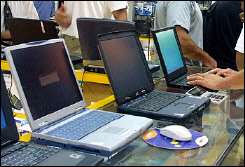India's laptop sales leap

Call it a new fad, or the emergence of a new breed of technology conscious IT users, or both. But a shift in working styles and the need for "anytime-anywhere" access to information is pushing laptop sales to dizzy heights in India with its sales numbers expected to cross 350,000 units in 2005-06.
According a Manufacturers' Association for Information Technology (MAIT), India's hardware industry lobby, Indians have started purchasing notebook computers faster than the industry would have thought, with notebook sales growing at 94 percent in the first half (April-September 2005) of the fiscal year 2005-06. This excludes notebooks imported by professionals on their personal account.
In the first half of the current financial year, Indians bought nearly 153,000 notebooks, compared to 36,000 units in the same period two years ago, said a recently released performance review of MAIT. It added that the momentum in the Indian notebook market is finally in sync with the global trend, where for the first time in 2005 notebook sales surpassed desktops sales.
This performance was led by the small and medium enterprises (SME) which, in turn, is supplemented by bulk purchases by large enterprises. Consumption by small enterprises grew 118 percent accounting for 17 percent of the total notebook sales to the business segment; sales to medium-sized enterprises grew by 136 percent accounting for 21 percent, MAIT said.
Compared to the first-half of the last fiscal year, sales to large enterprises grew by 102 percent accounting for 61 percent of the total sales in the business segment.
During the period, the desktop personal computer (PC) market grossed 2.34 million units registering a growth of 36 percent over the previous year. During April-September 2005, the ratio of desktop-to-notebook sales declined to 15 from 22 a year ago.
"Clearly, notebooks are competing with desktops with convenience and productivity scoring high", said MAIT adding that notebook sales have also found their way into homes. In first half of 2005-06, about 16,000 notebooks were sold to the household segment accounting for 13 percent of the total market.
So what's driving this sudden awareness of notebooks? After all neither notebooks nor laptops are new to the Indian IT users, and just like the desktops, computer makers were trying hard for years to push sales of notebooks too.
"One of the biggest factor pushing sales for notebooks is the affordability factor or reduction in prices" says Rajiev Grover, country category manager, Hewlett-Packard India. "India's personal computer market is undergoing a major transition as premium notebook computers are being brought to the mainstream, with almost half the prices, compared with a year ago."
On average, the prices of entry-level notebook computers now range between $800 to a little over $1000 compared to $1500 to over $2000 that prevailed about 12 to 18 months back. Moreover, notebooks now cost only around $200 more than a high-end desktop personal computer, which is also driving many desktop buyers to opt for notebooks.
However, according to Vinnie Mehta, the executive director of MAIT, another key driver has been the growth of newer professions, that not only require different working styles but also mobile devices for anytime-anywhere computing.
"For instance many type the IT-enabled workers or back office workers (like medical transcription workers) need not work out of an old fashioned office anymore. Similarly many financial and marketing sector professionals need to be one the move always," says Mehta.
Other factors like government policies helped too. "For instance, the government now allows duty free import of notebooks as personal baggage that has helped in increasing the notebook penetration with the people becoming more aware of these devices," Mehta said. "The government's focus on improving the IT infrastructure that has brought in technologies like wider wireless network (WAN, WiFi), which allows linking up of mobile devices to the internet at any place, has propelled its sales as well."
"The progression actually came from mobile phones, where people in India started to engage in mobility as a part of their business," he added.
Industry sources say that desktops which was the "symbol of corporate vanity till the other day are slowly becoming passé with notebooks now the mainstream."
And all this means that its party time for notebook vendors. But yet another important trend that is emerging from this shift is that while the multinationals notebook vendors are experiencing burgeoning sales, local notebook makers' cash registers aren't really ringing that loud.
"We don't expect notebook sales to match our desktops for quite some time," says Raj Saraf, chairman and MD, Zenith Computers, a biggish local personal computer manufacturer that claims to sell "MNC computers and local prices."
And the reason why MNC brand names are outselling local ones is that "we have been scoring one up on the utility factor," said the local spokesperson of Fujitsu PC Asia Pacific. "They (MNC brands) are growing and gaining the choice of the user not just because of the narrowing of the prices between desktop and notebooks but also because we have amalgamated next generation technologies like bluetooth and Wi-Fi with mobile computing to bring more utility to notebooks."
But it is also true that MNCV brands have been more aggressive sellers. "The last couple of years have seen intense price wars, with leading brands including Acer, HP and IBM forever racing to slash the price of their notebooks," says Mehta of MAIT.
Copyright 2006 by United Press International
















